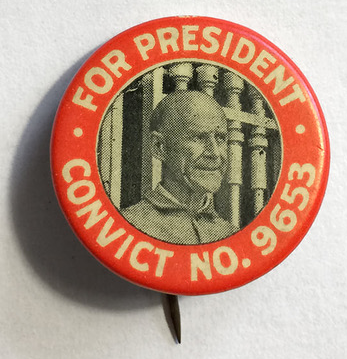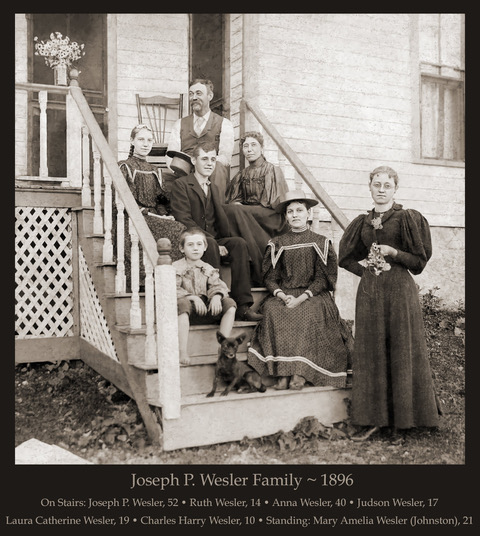When Your Ancestor’s Possessions Tell A Story

By Ken Johnston

The political leanings and beliefs of our ancestors can be interesting to study – and perhaps unexpectedly so. For instance, the presidential candidate’s campaign pin from 1920 pictured with this article was among the things belonging to my great-great-grandparents, Joseph and Anna Wesler. The man on the pin is the politician and skilled orator Eugene V. Debs, the 1920 presidential candidate for the Socialist Party.
He is pictured as “Convict No. 9653” because he was convicted of ‘espionage’ in 1917 after a speech he made opposing America’s entry into World War I.
Debs had run for President four times previously. In 1920 he was again nominated as the Socialist Party candidate, and he ran the campaign from his prison cell. Even so, he received 913,693 votes, 3.4% of the total votes cast for President in 1920.
This pin belonged to Joseph and Anna because they were members of the Socialist Party, and supported Debs. They were both very involved with and concerned about political and social justice, and were strong believers in unions to protect workers’ bargaining rights for fair treatment and wages.
In fact, Joseph was twice a Socialist Party candidate for Neosho (Missouri) County Sheriff, as was Anna for County Clerk. Joseph had even asked that a Socialist Party poem be read at his funeral – which it was, upon his passing in 1921.
This small pin is about 3/4″ across, and is the kind of thing that a person might find in a relative’s belongings and, not knowing the history or value, just throw it away. But since I knew that some people collect presidential campaign pins, I did a little research. I was amazed to discover that this pin is actually valued at approx. $1,500 – $2,000, and is quite rare. One pin collector who has one of these pins in his collection claimed that there were only 10 of this particular pin known to be in existence. And he valued it at $6,000!
Inexpensive replicas are now on the market, but few of the various original Debs pins are still known to exist. So it is fortunate (and quite amazing!) that in the past 100 years it wasn’t thrown away. It’s a small treasure now, not so much for its value, but for its part in my great-great-grandparents’ story as the very politically-involved Americans that they were for their time in history.

Joseph was a Union soldier with the Ohio Infantry for all four years of the Civil War, the last year of which he was a part of the Regimental Band. In 1870, he became a Nebraska homesteader, where he was not only a farmer, but also a contractor, brick mason, and school board member for the Beatrice, Nebraska school district. He married Anna in 1873, and they had six children.
In 1896 the family moved from Nebraska to Neosho, Missouri, where Joseph continued his work as a contractor and brick mason. He and Anna were active members of the Presbyterian church.
